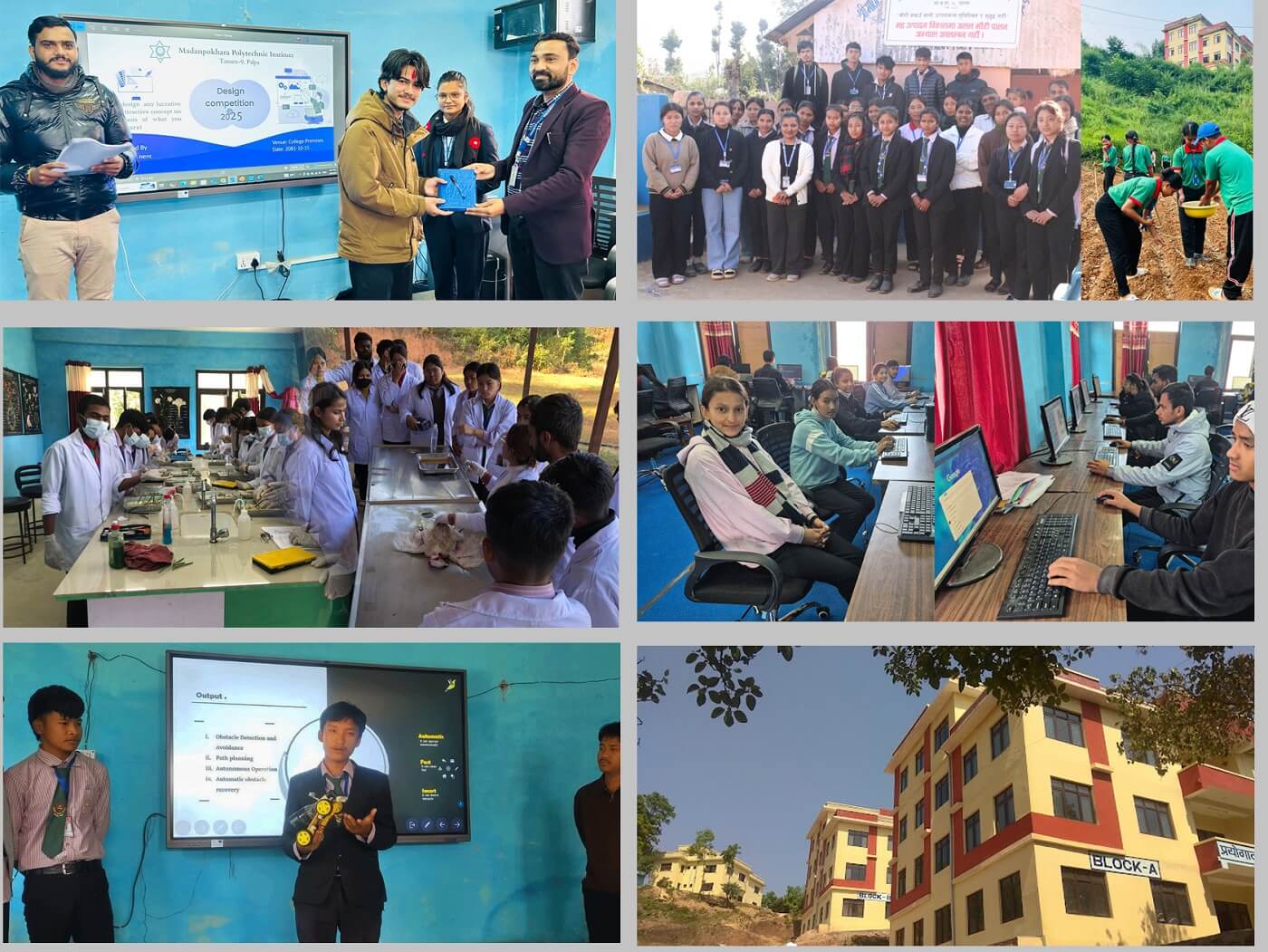Overview
Madanpokhara Polytechnic Institute (MPPI), situated in Tansen Municipality, Ward No. 9, Damkada, Palpa, was established in 2018 under the Council for Technical Education and Vocational Training (CTEVT). It offers technical education and skill-oriented training focused on agriculture and information technology.
The institute plays an important role in supporting technical learning in Lumbini Province. Focusing on practical knowledge, sustainable practices, and local development, MPPI prepares students for roles in Nepal’s evolving workforce.
Institution Overview
MPPI spans 120 ropanis of land and features well-structured academic and practical learning spaces. Its facilities include:
-
Administrative and academic blocks
-
Specialized buildings for theoretical and practical classes
-
IT laboratories and classrooms
-
Agriculture farms (vegetables, fruits, food crops, livestock)
-
Fish ponds and community-based forestry
This infrastructure supports applied learning aligned with national educational goals.

Vision and Mission
Vision
Technical and Vocational Education and Training (TVET) education for all.
Mission
To develop a skilled national workforce through quality-driven, demand-responsive TVET systems relevant to the local and national economy.
As a nonprofit public institution, MPPI provides accessible, skill-focused training that helps address youth unemployment and supports lifelong learning.
Academic Programs
MPPI currently offers four full-time, three-year diploma programs affiliated with CTEVT:
1. Diploma in Information Technology (DIT)
-
Seats: 48
-
Eligibility: SEE passed
-
Duration: 3 years
-
Admission: Through the CTEVT entrance exam
This program introduces students to key areas such as programming, database systems, networking, and hardware. It prepares learners for IT support, office automation, and system maintenance roles.
2. Diploma in Agriculture (Plant Science)
-
Seats: 40
-
Eligibility: SEE passed
-
Duration: 3 years
-
Admission: Based on the CTEVT entrance exam
The course covers crop production, soil science, plant health, and modern farming methods. Students gain hands-on experience working on the institute’s agriculture farms.
3. Diploma in Agriculture (Animal Science)
-
Seats: 40
-
Eligibility: SEE passed
-
Duration: 3 years
-
Admission: Based on the CTEVT entrance exam
Students explore livestock production, animal nutrition, health care, and farm management. The program prepares graduates for veterinary services, dairy farming, and animal husbandry employment.
4. Diploma in Forestry
-
Seats: 40
-
Eligibility: SEE passed
-
Duration: 3 years
-
Admission: Entrance exam through CTEVT
This course focuses on forest management, biodiversity, wildlife conservation, and ecosystem sustainability. It supports students who want to work with forestry departments, conservation organizations, or community-based programs.
Short-Term Training Programs
Besides regular diploma courses, MPPI also offers short-term skill development training. In the fiscal year 2075/76, more than 600 individuals completed vocational programs in areas such as:
-
Vegetable farming
-
Animal care
-
IT basics
-
Nursery management
-
Fishery practices
These programs target local youth and community members seeking immediate income-generating skills.
Learning Approach
MPPI’s teaching strategy emphasizes applied knowledge. The curriculum integrates field-based tasks, lab exercises, and collaborative learning. Instruction encourages:
-
Community relevance
-
Practical thinking
-
Environmental awareness
-
Job-readiness and ethics
Students are encouraged to explore real-world challenges and develop practical solutions based on observation, testing, and teamwork.
Institutional Values
MPPI promotes:
-
Inclusion in education
-
Environmental responsibility
-
Transparent public service
-
Skills that contribute to rural development
Faculty members support student learning with a balanced focus on knowledge, conduct, and civic participation.
Leadership Message
According to the principal, education is more than subject learning—it's about shaping responsible individuals who can contribute to social and economic progress. MPPI’s programs aim to create opportunities for practical education and personal development.
He stresses that meaningful outcomes arise from the combined effort of students, teachers, families, and the community. Education at MPPI reflects this collective responsibility.
Accreditation and Affiliation
All MPPI programs are affiliated with the Council for Technical Education and Vocational Training (CTEVT), which ensures that curricula meet national quality standards. Students receive certificates that qualify them for employment or higher education in Nepal and abroad.
Admission Process
Prospective students must pass the Secondary Education Examination (SEE) and apply for the CTEVT entrance examination. Admission is based on merit. Applications can be submitted directly to the MPPI campus during the intake period.
Academic Environment
MPPI offers:
-
IT labs with internet
-
Science and agricultural labs
-
A library with reference and learning materials
-
Agricultural fields, greenhouses, and animal sheds
-
Practical classrooms for technology and science
The natural setting and field-based learning support a productive and interactive academic atmosphere.
Conclusion
Madanpokhara Polytechnic Institute (MPPI) provides practical, skill-based education grounded in agriculture, information technology, and forestry. Through diploma and vocational training programs, the institute contributes to creating a workforce that is capable, responsible, and responsive to the demands of Nepal’s development sectors.
Its public-service model, focus on community engagement, and commitment to hands-on learning make MPPI a relevant choice for students seeking practical education and employment-focused training.












